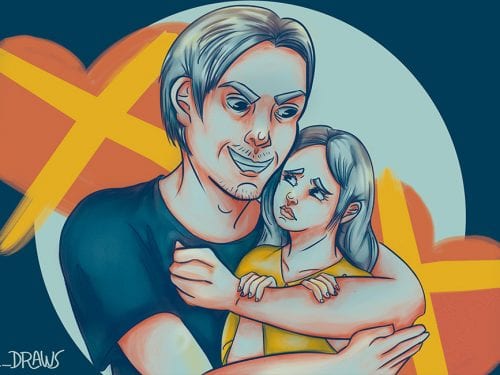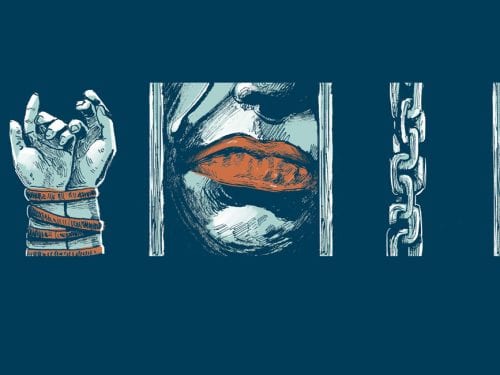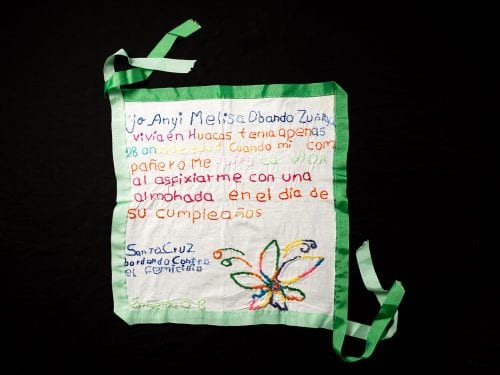
Tamar has her wild, curly hair tied up and hugs a Christmas tree with her three-year-old arms. She boogies carelessly around the house and casts a glance at her brother as if she were about to prank him. “It’s a bug” says her mother Dania, 37, with a distressed smile.
Dania, obese with a fatty liver and who walks with a slight hitch, also has a contagious laugh.
They live in a house with a red floor and bare walls and don’t have a penny in their pocket to buy food, or the cookies Tamar is always asking for, “but at least we have a roof.” Half-an-hour ago we were at the family court in Liberia reviewing a case file. Outside, October lightning struck the pavement.
In the case file, Dania wanted to show me that everything she told me over the last few days was the truth. And that five months ago, a judge, the attorney for her ex-partner Leandro, and her own attorney pressured her to sign a document that sentenced her to extreme poverty.
***
She was thrown out of the house and told she only had a right to take her clothes. /She had her business taken away and the convenience store that she helped open. / Her basic needs are denied as are those of her daughters. / She was sued in an effort to revoke food subsidies for her baby.
This paragraph is part of what the National Institute on Womens’ Affairs in Guanacaste recorded as part of its cases of patrimonial violence this year. The law against domestic violence explains that one form of aggression is when the perpetrator strips a victim of economic resources. It’s one of the many “invisible” manifestations of gender-based violence.
Victims are often the weakest links in the chain, like Dania. They are women without income who depend economically on their partners, who have lived through other types of violence.
While it’s not always the case, poverty is a common scene. Half of Guanacaste’s food subsidies that fathers pay are between ¢50,000 and ¢100,000 ($85-170) per month. Taking that money away from kids is one of the most common types of patrimonial violence against women, according to the Gender-based Violence Observatory. “Statistically, it is proven that women representing their children are usually the ones demanding this right,” the observatory’s website says.
That’s why the director of Inamu in Guanacaste, Melida Carballo, says that many women don’t leave their homes even when they are being beaten or abused in other ways. “If they leave, how will they take care of their kids?” she says.
***
Dania arrived 10 minutes late for a May 27 hearing. She remembers that they explained everything very fast, that Leandro was going to put the house under their girl’s name, that she would be the legal custodian of the property and that, in exchange for the house, the girl wouldn’t receive the $150 a month subsidy that she was awarded several months ago.
“I don’t know,” she repeats. “I don’t have a job or a husband. How am I going to take care of the girl?” Dania recalls the judge telling her something along the lines of “you came here to waste my time and not accept the deal?” And that the attorney the state gave her advised her to take the deal. “Look, Dania, you are Nicaraguan, you’re the one that loses here.”
If we were to dig around in her memory, we would see Dania living with Leandro and his mother three years ago in this house with a red floor. Dania was always cleaning and asking to get married. “Yes, we will get married” he would tell her. Dania would ask for money in order to file residency paperwork. “Sure, next week” he would tell her.
And if we go back a year and a half, we would see Leandro forcing her to have sexual relations in exchange for letting her stay in the house, when he had another partner and lived with her. “And like a fool, I would say yes,” Dania says, blaming herself. She also would remember that she had to go to Nicaragua, her native country, in search of clinical help for a vaginal infection she blames Leandro for because of his relations with another woman.
She remembers a year ago when she refused to have sex with him and he told several neighbors that he would stop giving her money because “she has another man.”
In her memory and in the case file, it’s evident Dania filed a case claiming the food subsidy in October 2018, fearing that she would no longer receive it. Leandro, who makes $580 a month working in a hotel, wanted to revoke the food subsidy claiming that $150 a month was too much money, that she also had to be responsible and that he was receiving unfair treatment by having to support the girl. He hired a private attorney and took the claims to court.
The records show that a judge whose last name is Rodríguez ruled against Leandro at the time, arguing that the subsidy would be for feeding the girl.
“The most reproachable part is that he indicates he’s not able to pay the $150 for the daughter, but he reserves $375 for supporting her, which is disproportionate.” The judge argues in the document, of which La Voz has a copy, that $150 barely covers the daughter’s most fundamental needs
Despite the arguments and evidence in the case file, some months later the family court judge who defended the girl’s rights would witness the signing of a deal that left Tamar with a house but without food.
***
He took the car that was in her name and never returned it. He forced her to transfer all property to him in the divorce. He made bank transfers to his account and left her with thousands of dollars of debt.
Inamu also recorded cases of patrimonial violence against women who don’t live in poverty or who don’t depend economically on their partner. She explains economic violence as another manifestation of the machista thought in which the woman (and everything related to her) belongs to the man: “if the woman’s body belongs to the husband or partner, with much more reason, the”things” that the woman has, belong to them”, she explains.
***
The first thing Liliana did when she “awoke” from violence was to eat a whole steak and get a tattoo of a phoenix on her right ankle.
“He would say to me, ‘you don’t eat meat. You don’t like it.’ I went years without eating a whole steak.” We have been speaking for hours and this is the first time that I see her weeping a little. Small it may seem, it was still an act of violence she endured for years at the hands of her ex-husband, though in reality he never stopped abusing her. He would just change the method.
When they got married, he didn’t let her leave the house, not even to visit her mother. When she was pregnant on December 31, 1999, he hit her so much that she went to sleep with the dog so that the dog would bite him if he came close. He also used to tell her that she was fat and ugly.
For the last eight years, he stole money, at first by going to the ATM with her cards. “He would withdraw money for me and for him.” Then he would buy fast food with her cards, or pay for Netflix, which she didn’t even know how to use. Then he took $10,000 in cash that Liliana hid under a mattress, a loan she took out to invest. A short while ago, he arrived at the high school where she worked and told her that if she didn’t co-sign a loan he would cause trouble.
If Liliana was “awake” she never would have signed it, she tells me now. If she had realized she was living through terrible abuse, she would have left. But if the violence that does leave a mark is hard to detect, patrimonial violence is practically invisible.
Now, 25% of her salary goes to paying the debts he accumulated. She doesn’t have a car, she can’t travel even though her salary allowed for it before. But the hardest part was not having the money to pay for her daughter’s semester in college after her partner robbed her one last time. She attempted suicide twice. The first time she took 25 sleeping pills and slept for 48 hours, and the second time she prepared to hang herself but ended up going to the hospital when she realized what she was doing.
The final step to escape this cycle was filing a criminal complaint with prosecutors. “When I did that, I felt like there was no turning back,” she says.
I want women to know that it’s not easy to talk about, but that when they do they are going to find open doors,” says Liliana, who still goes out with fear and who, when returns home from the gym, walks into every store she finds open to try and conquer her anxiety.
A professional, union member and defender of labor rights, she asks herself “how did I allow it to go this far?”
When I leave she asks me to write about her tattoo in this story so that women know it’s possible to overcome violence. “I feel like a phoenix. I haven’t yet been reborn from the ashes, but give me time.”






Comments